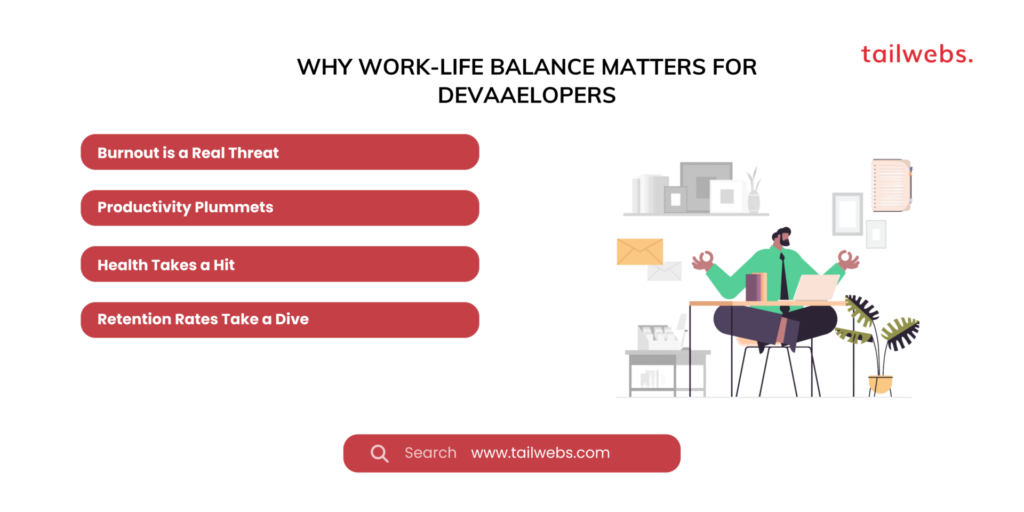The Developer’s Dilemma: Achieving Work-Life Balance and Avoiding Burnout in the Code Canyon
The world of code beckons with creativity, problem-solving, and the thrill of building something from scratch. But for developers, this digital wonderland can turn into a burnout battlefield if they neglect the crucial element of work-life balance. Juggling deadlines, fixing bugs, and mastering new technologies can be exhilarating, but it can also lead to stress, exhaustion, and decreased productivity. So, how do developers achieve that elusive equilibrium between coding prowess and personal well-being?
Why Work-Life Balance Matters for Developers:
Burnout is a Real Threat:
52% of developers report experiencing burnout, with symptoms like chronic stress, fatigue, and decreased motivation. (Stack Overflow, 2023)
Productivity Plummets:
A stressed-out developer is an unproductive one. Burnout lowers focus, creativity, and decision-making, ultimately hindering performance.
Health Takes a Hit:
Neglecting personal time can lead to physical and mental health issues, impacting energy levels, sleep patterns, and even relationships.
Retention Rates Take a Dive:
Companies with unhealthy work cultures see increased developer turnover, resulting in costly recruitment and re-training.

Stats Paint a Compelling Picture:
Companies that prioritize work-life balance experience 21% higher profitability. (Forbes, 2023)
78% of developers say a good work-life balance is important for their job satisfaction. (GitLab, 2023)
Employees who feel they have a healthy work-life balance are 57% more productive. (Gallup, 2023)
Building a Bridge Across the Code Canyon: Strategies for Work-Life Balance
Set Boundaries and Stick to Them:
Establish a clear separation between work and personal time by setting fixed working hours, and avoid checking emails or code outside those hours.
Embrace Flexible Work Practices:
Remote work and flexible schedules can empower developers to manage their time effectively and integrate personal commitments into their workday.
Prioritize Vacation and Breaks:
Don’t let vacation days pile up! Actively take breaks and plan vacations to disconnect from work and recharge for optimal performance.
Learn to Say No:
Overwork is a recipe for burnout. Don’t hesitate to decline additional tasks if your workload is already heavy.
Create a Healthy Work Environment:
Invest in ergonomic setups, take regular breaks for movement, and prioritize good sleep and healthy eating habits to combat stress and maintain physical well-being.
Communicate Openly with Your Manager:
Discuss your workload, concerns, and need for balance with your manager. A supportive manager can advocate for your well-being and adjust deadlines when needed.
Tools and Techniques to Tame the Coding Beast:
Time Management Techniques:
Employ techniques like the Pomodoro Technique to break down tasks into manageable chunks and schedule breaks for optimal focus.
Project Management Tools:
Utilize project management platforms to prioritize tasks, set deadlines, and track progress, ensuring clarity and efficiency.
Automation and Delegation:
Delegate repetitive tasks to tools and platforms whenever possible to free up time for more creative and strategic work.
Mindfulness and Meditation:
Practices like mindfulness and meditation can help developers manage stress, improve focus, and cultivate resilience in the face of demanding projects.

Overcoming the Challenges: When the Code Gets Chaotic
Maintaining work-life balance isn’t always easy, and developers often face challenges:
Unrealistic Deadlines:
Tight deadlines and demanding projects can put pressure on developers to sacrifice personal time.
Always-On Culture:
The tech industry’s fast-paced nature can create an expectation of constant availability, blurring the lines between work and personal life.
Lack of Support:
Companies with inflexible work cultures or unsupportive management can make it harder for developers to prioritize their well-being.
Building a Culture of Balance: A Collective Effort
Achieving work-life balance for developers requires a two-way street:
Developers:
Take ownership of your well-being, implement the strategies discussed, and advocate for your needs.
Companies:
Foster a culture of balance by offering flexible work practices, supporting vacation time, and promoting healthy work-life boundaries.
By working together, developers and companies can create a thriving tech ecosystem where code thrives alongside well-being, and where developers can unlock their full potential without sacrificing their health and happiness.
Join the Movement: Become a Work-Life Balance Advocate
Share your experiences, tips, and stories of successful work-life balance as a developer. Inspire others to prioritize their well-being, advocate for supportive company cultures, and contribute to building a healthier, more balanced tech environment.
Together, let’s bridge the gap between the code canyon and personal fulfillment, because a life filled with lines of code deserves moments filled with laughter, sunsets, and the freedom to explore the world beyond the flickering screen. By championing work-life balance, we can rewrite the narrative of burnout and replace it with a story of thriving developers, building not just software, but also fulfilling lives.
Remember, a developer in balance is a developer unleashed:
More Creative:
A rested mind fosters innovative solutions and sparks unconventional approaches to coding challenges.
More Productive:
Focus and drive soar when fueled by personal fulfillment, resulting in efficient coding and timely project completion.
More Motivated:
A sense of well-being ignites passion for the craft, leading to sustained engagement and enthusiasm for coding projects.
More Adaptable:
Developers who prioritize balance are better equipped to handle the ever-changing landscape of technology, embracing new challenges with resilience.
More Inspiring:
When developers showcase a happy and healthy work-life balance, they become role models for others, influencing a wave of positive change within the tech community.
Leave a legacy of code and contentment:
Share your story:
Inspire others by writing blog posts, giving talks, or participating in online forums, sharing your journey towards work-life balance as a developer.
Mentor junior developers:
Guide aspiring coders towards healthy work habits and empower them to prioritize their well-being alongside their technical skills.
Hold companies accountable:
Advocate for changes within your organization, urging colleagues and management to implement policies that support developer well-being.
Celebrate successes:
Recognize and celebrate individual and collective achievements in maintaining work-life balance, reinforcing the importance of this concept within the tech ecosystem.

The future of tech belongs to those who can code with brilliance and live with balance. Let’s build a world where these two worlds harmoniously converge, a symphony of innovation born not from burnout, but from well-rested minds and fulfilled hearts.





